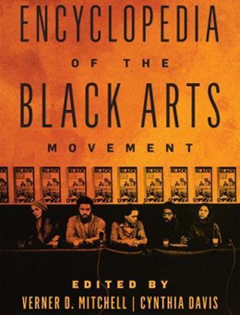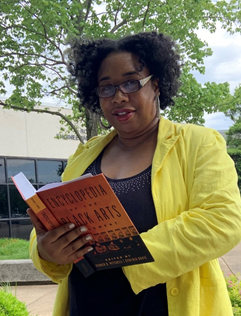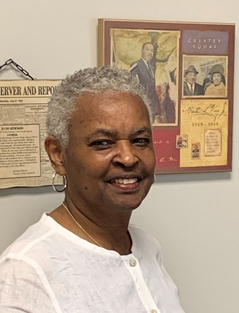Languages and Literature faculty contribute entries to New Encyclopedia
Two instructors in the English Department at Southwest are featured prominently in a new reference book set to be released in May about an important African-American literary movement.

Latoya Jefferson-James and Dr. Loretta McBride authored several entries for the Encyclopedia of the Black Arts Movement, a collection of essays by contemporary scholars on key figures in the Black Arts Movement. The book highlights innovative African-American artists, musicians, novelists and playwrights whose work in the late 1950s to the end of the 1970s—in tandem with the revolutionary rhetoric associated with the Civil Rights movement, Black Muslims, and Black Panthers—inspired a generation of African Americans to vie for equality, act independently and make their own free choices.
The movement represented the most prolific expression of African-American literature since the Harlem Renaissance of the 1920s and produced some of America’s most original and controversial artists and intellectuals.
Jefferson-James wrote the introduction and contributed essays on Malcom X’s influence on the Black Arts Movement, Jamaican writer Una Marson, and the Deacons of Defense and Justice, a civil rights justice group. She said the Black Arts Movement is difficult to write about because it is the shortest literary period of African-American literary studies to write about, and the fact that it has been dismissed by other black literary scholars.
She argues in her introduction that the Black Arts Movement is still going on today and gave rise to rap music. Jefferson-James points to singer Beyonce’s Superbowl 50 appearance in February 2016 when she paid tribute to Black Lives Matter. All of the back-up dancers were dressed in black with black berets and afros reminiscent of the Black Panthers of the 1960s.
“I don’t care what African-American literary scholars say about when it ended,” Jefferson-James said. “When you place it in the scope of that movement, rap music came out of the Black Arts Movement. So it is still going on because rap music is still going on.”

Latoya Jefferson-James, Adjunct Instructor Languages and Literature
In her essay about Malcolm X, Jefferson-James examines how the writers in the Black Arts Movement paid homage to him. “Most of the writers in the Black Arts Movement were not southern,” Jefferson-James said. “They were mainly from the northeast and West Coast. And Malcolm X was speaking to what he felt was the hypocrisy of liberals up north. There were plenty of racial incidents going on at the time right there in Oakland and Chicago and Detroit that the media wouldn’t even air. They demonized the South, particularly Mississippi.” Jefferson-James said Malcolm X was just trying to tell America that the racism going on in the northeast and west wasn’t getting any attention at all.
Jefferson-James also wrote about Una Marson who was responsible for almost single handedly giving voice and exposure to the Caribbean Artist Movement in London. Marson worked at the BBC and brought attention to the works of George Lamming, a Barbadian novelist, essayist and poet, and Derek Walcott, a Nobel Prize-winning Saint Lucian poet.
“She was a poet and a writer out of Jamaica who was also a social worker,” Jefferson-James said. “She worked at the BBC and would invite these writers from the Caribbean to the studio. It was because of her work at the BBC that we have Caribbean writers in circulation right now.”
Her other entry in the encyclopedia is about a little known Louisiana justice group called the Deacons of Defense and Justice. Jefferson-James said the Deacons have been left out of the civil rights history narrative because they started in the deep South.
“They actually aided Martin Luther King when he finished up the Meredith March Against Fear. They were an armed group who believed in self-defense,” Jefferson-James said. “They helped bring about one of the greatest victories in the Civil Rights Movement that you will never hear of, and that was the victory at Natchez, Mississippi. The Deacons put pressure on the powers that be and they won victories for the movement with absolutely no government interference. No one has ever heard of them and I think they are purposely left out of the narrative.”

Dr. Loretta McBride, Professor of Languages and Literature
McBride’s contributions to Encyclopedia of the Black Arts Movement include essays on the poetry of Malcolm X; Emmett Till in Literature; Blues for Mr. Charlie, a play by James Baldwin; and Soul on Ice by Eldridge Cleaver.
“I wrote about the poetry about Malcolm X that was in Black Fire, the anthology that was edited by Larry Neal and Amiri Baraka,” McBride said. “I wanted to know what, if anything, unified those particular poems. Usually they were about the definition of manhood.”
McBride said she absolutely agrees with Jefferson-James that the Black Arts Movement is still going on – especially in today’s music.
“As (Jefferson-James) said, it is one of the most overlooked periods for two reasons. One was the homophobia. The other is misogyny. That’s why it is so overlooked,” McBride stressed. “But the movement is still going on, especially if you look at the assassination of black males not only in character but in the media also.”
McBride said she spends a lot of time on the Black Arts Movement when she teaches because it has a lot more to do with the modern era than students realize. Rapper Kendrick Lamar’s performance of his song “Blacker the Berry” at the 58th Grammy Awards in 2016, forced America to experience modern day racism. Lamar had shackles around his ankles and wrists and was dressed in a blue prison uniform and chained to four other men to serve as a reminder of black oppression—from slave ships to the current day issue of mass incarceration of black males age 25-44.
“I am not his audience – I thought,” McBride said. “But when I looked at his performance at the Grammys and he had people who were on the slave ships, I thought ‘okay, I am his audience.’ He has bridged the past with the present. So when I look at somebody like that, I think of the social consciousness in the poetry that occurred in the Sixties.”
Jefferson-James said the Encyclopedia of the Black Arts Movement is an important work because it is one of the most glossed over and least understood periods of African-American history. She says students and scholars need to know that they are still living with the ramifications of the Black Arts Movement today.
“It was a difficult book to write,” Jefferson-James said. “People are really intimidated by the Black Arts Movement. But if it were not for the Black Arts Movement, we would not have the proliferation of rap. We would not have the proliferation of the student movement. We would not have the proliferation of African-American Studies programs or other ethnic studies programs throughout American today. It was their protests that diversified the curriculum. And it was the Black Arts movement that gave us rap music. It took poetry out of the Ivory Tower and said this is poetry for everyone.”
Encyclopedia of the Black Arts Movement will be released May 15 and is co-edited by Verner Mitchell, professor of English at the University of Memphis.
In This Issue...
- Message from President Tracy D. Hall
- Welcome aboard, new team members
- Welcome aboard: Registrar, Veda Y. Taylor
- Welcome Aboard: Muinat Abolore Idris
- Welcome Aboard: Mark Randall, Public Relations Coordinator
- CAREER SERVICES CORNER: Top 20 employers of Southwest graduates
- MENTAL HEALTH CORNER: How age-accomplishment expectations are leading to less gratitude
- D.R.E.A.M. peer mentors and coaches host inaugural Café Social
- Equity and compliance rolls out new system for reporting and managing behavior
- Robertson keynotes commencement; urges graduates to MAP out their path forward
- Mentees and mentors recognized at SMARTS Culminating Experience
- Awards convocation celebrates student academic, leadership and service excellence
- CULINARY CORNER WITH CHEF STEVEN LEAKE
- EMPLOYEE OF THE MONTH: Director of Student Development Phoenix Worthy
- Incoming freshmen preview college life at Saluqi Day
- KUDOS: Dr. Melanie Jones is first community relations ambassador to make presentation
- DID YOU KNOW? Library provides free writing app to Southwest students
- Faculty and staff awards honors employees’ outstanding performance
- Earth Day Dash runners brave weather to support Science Club
- Languages and Literature Department announces published works
- Languages and Literature faculty contribute entries to New Encyclopedia
- "Love Boat" TV star Ted Lange teaches students about show business
- Southwest Students to attend ImagineU entrepreneurship training
- SALUQI CORNER: Dynamic duo Bryant and Pugh lead Saluqi softball team to TCCAA conference
- May is National Moving Month: Be mindful of moving companies
- Southwest: In the News